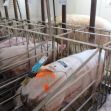The U.S. Supreme Court has decided to hear a challenge to California’s Proposition 12, the Farm Animal Confinement Bill passed back in 2018. The National Pork Producers Council (NPPC) and the American Farm Bureau Federation (AFBF), the plaintiffs in the suit, argue that the amendment is unconstitutional based on the regulations and costs the law will put on out-of-state farmers.
Proposition 12 is a Health and Safety Code amendment of the California statutes which bans the sale of pork, eggs, and veal products if the animals were bred in conditions that did not meet a certain minimum space requirement. While the amendment covers calves raised for veal, breeding pigs, and egg-laying hens, the largest source of opposition has come from the pork industry.
To sell pork in California, under Proposition 12, a pig must be born to a sow that was housed with at least 24 square feet of space and can freely turn around without touching the enclosing walls. The petition for a writ of certiorari states that “almost no farms satisfy [this regulation] (for good reason)” and that the cost of retrofitting a farm is a price that will be too high for farming families to cover. Companies that do not abide by the minimum space requirement are banned from selling their products in California. They are also liable for up to a $1000 fine or 180-day jail sentence.
In 2018, the bill, authored by the Humane Society of the United States, passed with a 63% majority of California voters. In a statement after passing the amendment, the Humane Society called the bill only a “modest” law to prevent animal cruelty.
The amendment was scheduled to take effect this year, in 2022, until a state court judge issued a 180-day injunction due to the lawsuit filed by NPPC and AFBF, who hold that Prop 12 is “based solely on a desire to prevent what California considers animal cruelty that is occurring entirely outside the State’s borders.”
The NPPC is made up of pig farmers “as well as the entire pork chain and associated businesses such as veterinarians, pork packers and processors.” They have 42 affiliated state associations, including the California Pork Producers Association, based in Sacramento, California. They focus on federal and state legislation, regulations, and trade initiatives to “protect[] the livelihood of America’s 60,000 pork producers."
AFBF, on the other hand, is an organization with the “purpose to improve the conditions of farmers” and calls itself the “Voice of Agriculture” as a whole. AFBF President Zippy Duvall, in a statement regarding the Supreme Court petition, said “Supporters of Proposition 12 claimed it would improve animal welfare and food safety.” However, he continued, “farmers know the best way to care for their animals. This law takes away the flexibility to ensure hogs are raised in a safe environment.”
One of the Humane Society’s “Big Fights” is improving the lives of farm animals “by reducing the suffering of animals raised for meat, eggs, and dairy.” Their long-term goal is to abolish cages and crates to hold animals. The Humane Society of the United States and the Animal Legal Defense Fund intervened as parties in the case rather than filing amicus briefs.
The plaintiffs argue that this California law neglects earlier Supreme Court Decisions on the Commerce Clause of the U.S. Constitution which held that “laws with significant extraterritorial effects violate our federalist scheme.” The Commerce Clause under the U.S. Constitution gives Congress the authority “[t]o regulate Commerce with foreign Nations, and among the several States.” The Plaintiffs argue that the regulations put the entire burden on out-of-California producers and are “impermissibly extraterritorial.”
The 9th U.S. Circuit Court of Appeals originally rejected the arguments made in the lawsuit in July 2021 because they found that the law was only regulating California-based farmers and that the increased costs argued by the plaintiffs were “not impermissible.” The decision stated that “[Prop 12] merely precluded ‘a more profitable method of operation… rather than affecting the interstate flow of goods.”
The 9th Circuit Court also likened Proposition 12 to another California law passed, and later affirmed in 2019, that bans the sale of foie gras from birds that had been force-fed. California consumes about 15% of the country’s pork, importing 99.87% of its pork products. California has less than 0.2% of the national breeding herd. The U.S. pork industry is a $26-billion-a-year industry, according to the petition filed with the Supreme Court.
The lawsuit filed to block the enforcement of Prop 12 is supported by 20 state governments as well as the Canadian Pork Council and 14 non-California-based businesses or farm associations. The lawsuit argues that the increase in cost as a result of the amendment would fall almost completely on farmers outside of California, primarily pig farmers.






